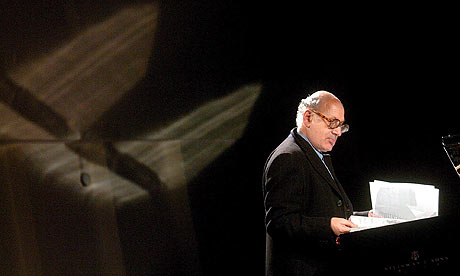This evening was as much about Michael Nyman the filmmaker and photographer as it was about Michael Nyman the composer and pianist. Billed as Music From and For Film it was a rare opportunity to catch this highly acclaimed and most venerated of British artists playing solo piano music against a backdrop of films.
Perhaps best known for his career as a film composer (his scores for Peter Greenaway, Michael Winterbottom and the soundtrack to Jane Campion’s The Piano are those with which he will forever be associated), the first half of tonight’s performance sees him accompanying a sequence of his own short films. Inspired by and recorded in the locations in which he was found himself as both a performer and composer – The Bull, Berlin Lobbyists and A History of Cinema part 67 were filmed in Spain, Germany and France respectively – at first glance they share certain characteristics with the home-movies of any other foreign tourist. They combine haphazard camera movements and oblique angles with a deceptive simplicity. Closer inspection, however, reveals them to be wholly inorganic yet really quite unique documentaries of the absolute ordinariness of human behaviour. Morra, for example, is a hand game wherein your opponent tries to predict the number of fingers that you will reveal. Here its tension and competitive spirit is almost casually captured after the players had just eaten lunch.
These vignettes of humanity were not originally filmed with a soundtrack in mind. In fact, the music appears to have very much been an afterthought. Yet the often repetitive nature of the visual images – A History of Cinema part 67 involves a leisurely walk past row upon row of beach huts, the fences outside which have the names of individual film stars painted onto them – is reflected in Nyman’s attendant music. The modular themes and harmonic sequences he employs may well often be repetitious but they extend far beyond that fundamental technique. His music effortlessly carries both melody and rhythm as it crosses genres which range from the neo-classical to folk and pop.
The second half of the performance has Nyman playing alongside À propos de Nice, a silent short documentary film from 1930 which was directed by Jean Vigo and photographed by Boris Kaufman. In many respects an early forefather of Nyman’s very own social documentaries it is an often ironic observation on the futility of indolence. It is by turn capricious, hallucinatory, voyeuristic, grotesque and strangely erotic, contradictions which are all marked in the potency and dynamic of Nyman’s sympathetic score.
This was ultimately far much more than mere music from and for film. It was a remarkable, occasionally brilliant aural and visual representation of the concepts of accident and chance, brought to life through the imagination of one man. That man was, and is Michael Nyman. And as if to underline the sheer normality which formed the basis to this vision after his performance he stayed behind to sign a few CDs before promptly dashing off to catch his train home.
Photograph: Manuel Bruque/EPA




